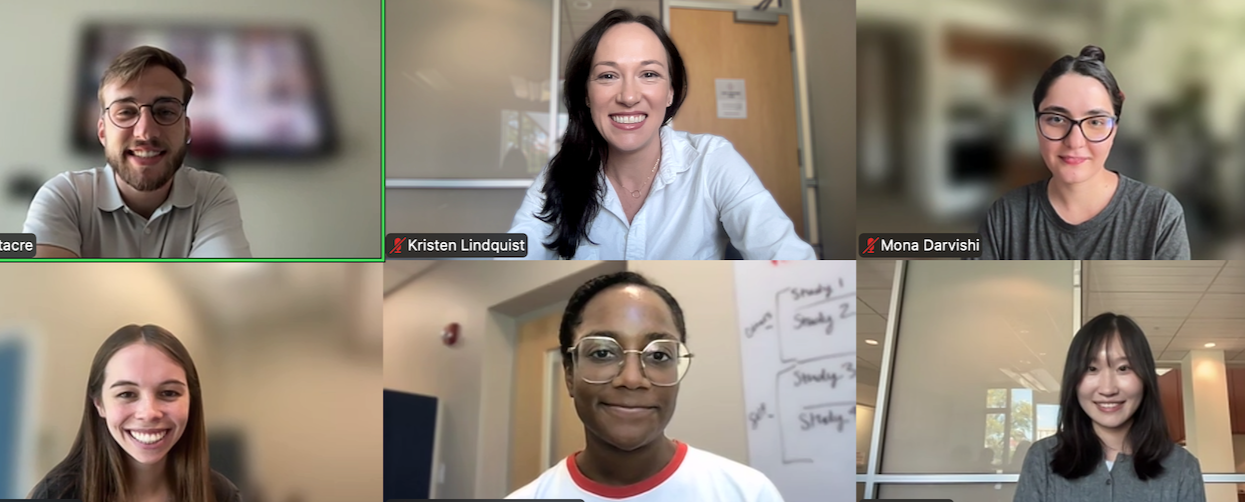After 13 years at the University of North Carolina, the lab has taken up a new home in the Department of Psychology at The Ohio State University and the OSU Center for Cognitive and Behavioral Brain Imaging! Please note that while some lab trainees and projects remain at UNC Chapel Hill, all new research assistants, graduate applicants, and postdoctoral applicants should apply for positions at OSU.
FOR undergraduate research assistants
We will not be considering undergraduate trainees at OSU until summer 2026 due to our move.
for graduate applicants
Applications for the Autumn 2026 cycle are now closed.
For future applicants, Dr. Lindquist accepts students through both the Social Psychology Program and Cognitive Neuroscience Program in OSU’s Department of Psychology.
Please note that Dr. Lindquist does not conduct pre-application interviews via Zoom or email to ensure equity across applicants. Below are some answers to common questions about applying to the lab:
What are you working on?
The lab will be analyzing data from our recently completed and on-going studies for years to come! These include:
Emotion and Physiology in Context (EPIC): EPIC is a multimodal study (imaging, psychophysiology, ecological momentary assessment, behavioral assessment of interoception) of emotional experiences, affective decision making and emotion regulation in healthy adults aged 18-85. Its major hypotheses ask how age-related changes to the brain and peripheral nervous system are associated with age-related changes in emotional intensity, emotion regulation, and affect-based decision making.
Physiology and Cognition (PAC): PAC examines how interoception moderates the effects of an induced allostatic perturbation (i.e., hunger) on decision making in healthy young adults.
SUPER Brain: SUPER Brain is housed at UNC in collaboration with Dr. Eva Telzer’s lab and the Winston Center on Technology and Brain Development. SUPER Brain is a longitudinal multimodal study (imaging, ecological momentary assessment, behavioral assessment of interoception) in children and adolescents aged 8-12 that is in wave 2 of longitudinal data collection.
Social Affective Neural Integration: This multimodal study (imaging, end of day surveys assessing social interactions and affect) was conducted in collaboration with Dr. Jessica Cohen’s lab and Dr. Barbara Fredrickson’s lab. The study examines how dynamic changes in brain functional organization during social affective experiences (pleasant and unpleasant social exchanges) are associated with well-being and social behavior in daily life.
What are you going to work on in the future?
See our Research Themes to get a sense of the direction of the lab. Right now, the lab’s focus continues to primarily be on the role of the body in emotion (how interoception and visceral states shape emotion) as well as life-span shifts in the construction of emotion (from early childhood to late adulthood). We are also interested in questions about language and emotion, particularly as they pertain to cultural differences and cultural evolution of emotion using large-scale language models and questions about individual differences in emotional expertise (Who excels at understanding their emotions and emotional functioning? How could someone who has difficulty with their emotions become better at emotional understanding?)
What do you look for in a graduate student?
Research experience in psychology, neuroscience, or a related field is a must. Having experience with neuroimaging, physiology, or coding is definitely a plus, but is not required. Although we study social behaviors, questions about emotion and affect should be central to your interests. More generally, you should be aware of and interested in theories of emotion, particularly constructionist/predictive processing approaches.
What type of students do best in the lab?
Students who are intellectually curious, hardworking, good communicators, and capable of being independent tend to thrive in the lab. We are also a highly collaborative group who does team science, so being a team player is essential.


